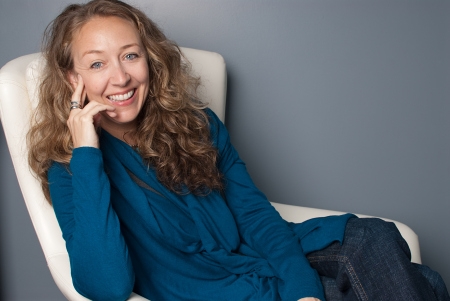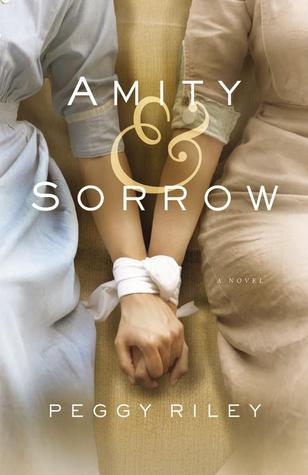In this version of twenty questions, I send a list of questions to a willing victim author and they choose their own interview by choosing which questions, and how many questions, they want to answer! Peggy Rileys’s debut novel, Amity & Sorrow was my editor’s pick for the April edition of Bloggers Recommend and it was Riley’s talent for making her characters so real that you want to shake them, that made such a lasting impression on me. Here is what Peggy had to say about reading, writing, and “wanting more room to tell a story”.
choosing which questions, and how many questions, they want to answer! Peggy Rileys’s debut novel, Amity & Sorrow was my editor’s pick for the April edition of Bloggers Recommend and it was Riley’s talent for making her characters so real that you want to shake them, that made such a lasting impression on me. Here is what Peggy had to say about reading, writing, and “wanting more room to tell a story”.
Would you give us a bit of introduction and let my readers know who you are, how you got started writing, and what kind of books you like to write?
Hi there! I’m Peggy Riley and my first novel is Amity & Sorrow, about two sisters who are taken by their mother from the fundamentalist, polygamous cult that they call home. I trained as a playwright and have been writing solely theatre, with the odd short story thrown in, since university. In my 40s, I found my writing was changing. I wanted more time and more room to tell a story. I wanted to see if I could find a new way to write. I’m very interested in women’s stories and women’s history. I’m interested in how groups form, how communities come together, and I often write about faiths, myths, and beliefs.
I am often struck by the different ways writers respond to the process of writing a book. Can you share with us any routines, food or recipes, or favorite books or rituals that help you thorough the writing process?
I’m never looking for a way to escape the process, really. I’m looking for ways to burrow in, to go as deeply into the questions I’m asking of the story, as far in to the characters as possible. I’m very lucky to have a little writing hut at the bottom of the garden, the Blue House, and it is filled with notebooks and reference materials, maps and mood boards, stacks of messy drafts. I want to wear a book like skin when I’m writing; I want to smear myself with it. I cut up drafts and push them around on the floor. Aside from the constant ritual of tea, an over-hot bath aids the transition from a hard writing day to being vaguely human, able to be communicative or sociable. Writing makes it hard to speak, for me. But even in the water, more ideas come – and thankfully so! My notebooks are all waterlogged and the handwriting appalling, elbows up on the bath. When the obsession wanes and the questions stop coming, then I know I’m nearly done, and then the editing begins, to grapple with the words. And then the next obsession starts and I find myself buying odd, unrelated reference books and wondering how they fit together.
 What was it about this the story that made it the one you had to tell at this time? What impact did telling this story have on your life? Did you find that it had changed you?
What was it about this the story that made it the one you had to tell at this time? What impact did telling this story have on your life? Did you find that it had changed you?
You’re right. Stories do make you tell them. They nag and wheedle and don’t let go. I had carried the seeds of the idea for Amity & Sorrow around with me for a long time, and tried to put it on stage, but it didn’t work. It didn’t fit, but the story wouldn’t let me go. I had to know more about the characters and what they wanted and what would happen. Following the story changed my writing; it changed how I write.
What are you reading now? What are some of your favorite books and authors? Has writing your own book changed the way that you read?
I find it very hard to read anything other than reference that pertains to what I’m writing, while I’m writing. It isn’t so much a worry about being influenced, but I know I’m not able to detach enough to enjoy someone else’s story. My mind is too busy chewing over my own. My eyes will skim pages and pages, but my head is somewhere else. It isn’t fair to other books and writers, so I wait until I’m done with something, then I binge-read like the clappers.
What was the most interesting thing that you found out while researching this book that you ultimatley decided not to include?
I did a lot of research on fundamental and polygamous American faiths, most particularly the early Mormon church of Joseph Smith. But the news overcame my writing. When the compounds of FLDS leader Warren Jeffs were raided, I was fascinated by the stories that emerged. The more I read, the more I realised I would have to invent my own cult, build my own faith from all the faiths that had come before, from Shakers to the Branch Davidians, from Charles Manson to Jim Jones’ Peoples Temple, which I remember so strongly from my childhood. I wrote a lot of this kind of “pioneer feeling” early Mormon material and then cut all of it. It is too specific and belongs too much to all the “escape” books that have been coming out. That isn’t my history, so it was easy to let go.
In the past I have visited a blog called Daily Routines and it’s all about the schedules of writers and creative people. What does a typical day look like for you and how do you manage a busy schedule?
A typical day involves rising, appeasing the ancient cat, and firing up the kettle in the Blue House as early as possible, rumpled and sleepy-eyed. I do morning pages with the first cup of tea by my elbow, and I do them online at 750words.com, a fantastic site. A quick hello to Twitter and I work for as long as I can. That’s pretty much my perfect day. Now, there are more tasks to be done at the same time. There are deadlines set by others. There are blog posts to write and questions to answer (happily so!). There are bits of book business that must be done, copy writing or line editing or page proofing. Days are much busier now and more social than I’m used to, but the job remains – the writing must be done. You have to schedule in writing time and guard it jealously, no matter how busy the days become.
Did you know what you wanted the title of the book to be? How involved were in choosing the name of the book?
I find titles very difficult. Most everything I’ve written has been titled by someone else, once they’ve read through it. Others can pick a phrase or series of words from what I’ve written and say – that’s obviously the title – and I will realise it was right there, staring at me, but I couldn’t see it. I’ve had lots of working titles over lots of drafts. I gave a list of 30 titles to my agent. Amity & Sorrow was top of the list and she said – that’s it – and I had to agree, once again!
Do you ever look back at your early work? How do you feel your writing style or approach to writing has evolved since you first began?
I don’t look back, really, and I throw away stacks of drafts once a thing is done. I rarely read early drafts of things that I write now, either. I have to write them, to get to where I’m going, to understand what it is I’m trying to say and how I feel. I don’t read these drafts before I write the next one. I write them to get through them, get past them. I write a lot of drafts before I begin to feel that any of the text is set, as it were. I get to grips with characters through dialogue and monologue, hangovers from my playwriting years, I suppose, but I have to get the characters’ voices before anything else will come. I wait for them to tell me what they want. I probably approach writing in the same way but what I’m writing is different – the form itself is different. I also think I write with my heart much more now than I used to. I used to only write with my head.
What were your experiences with reading when you were growing up? Was there a pivotal moment in discovering literature when you knew that you wanted to be a writer?
I was a compulsive reader as a child. I always had a book in my hand and was allowed to spend whole summers reading. It sounds a cliché, but I cannot remember a time when I could not read. I don’t remember “the click” of understanding that letters made words and ideas. I don’t remember a time when I didn’t write my own little stories, staple together my own little handmade books. It’s all I’ve ever wanted to do, but I had a lot of other jobs and diversions, because life is never straightforward – and the cat’s got to eat.
How many works in progress do you have going at any one time? How do you know when one has potential and when one just needs to be scrapped?
I only write one big thing at a time, and occasionally squeeze out a short story in the middle of it. I didn’t know that I could edit one thing and write another at the same time – it’s a bit of a tightrope walk, but it’s possible! I have several plays that I’ve scrapped, things that just didn’t hold together no matter how many drafts I’d done, things that never came to life. It’s painful, but you recover by finding another story to replace it or another question you want to ask. I’m very grateful I didn’t have to scrap Amity & Sorrow.
As a published author, what’s been the biggest surprise about life after the publication of your first book?
I am surprised by the generosity of readers, the whole community of book-lovers that reads and blogs and talks about what they’re reading. Blogging and the internet have given people so many ways to find each other and to find new books. It’s a very different community to theatregoers or the kinds of people who read plays, most often looking for audition pieces. I’m grateful to be a part of it.
What’s next?
I’m editing my second novel, which is set in the women’s internment camp on the Isle of Man in WW2. I put it down to launch Amity & Sorrow, and plan to pick it up again, come May. Thank you for asking!





